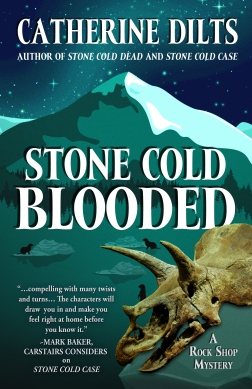by Catherine Dilts
 One of the first bits of advice an aspiring author receives is “write what you know.” For many years, I didn’t have a clue what that meant. After all, my life seemed dull. Many writers I knew had led lives of intrigue, or at least had cool job titles. How could writing about what I knew possibly be of interest to readers?
One of the first bits of advice an aspiring author receives is “write what you know.” For many years, I didn’t have a clue what that meant. After all, my life seemed dull. Many writers I knew had led lives of intrigue, or at least had cool job titles. How could writing about what I knew possibly be of interest to readers?
I spent several years toiling away in a factory. Determined to get some mileage out of all that pain and suffering, I wrote, and sold, my first short story set in that factory. I’ve learned that what is ordinary to me may seem intriguing to an outsider.
Your experiences may seem bland only because they are so familiar to you. I have some hints to help you see the extraordinary in the ordinary.
Finding the Key
The key to writing what you know begins with taking a fresh look at your experiences. Apply your unique knowledge of people and places to show readers something new.
Setting: Readers may think they know all about Kansas City, the maternity ward in a hospital, or flea markets. If you have knowledge of the inner workings of these environments, your reader will be delighted to walk inside that world with you. There’s nothing like the feeling of being an insider.
Maybe your setting is familiar to you, but it could be a strange new world to your readers. Ovidia Yu’s Aunty Lee series takes place in Singapore, Yu’s home town. Craig Johnson’s Wyoming setting for his Longmire series is new territory to a city dweller or easterner.
Try to observe your environment through fresh eyes, as though you’re a visitor. Don’t just look. Take in the smells and sounds. What captures your imagination?
Characters: If you’re creating a new character, or looking for ways to make your characters more interesting, try people watching. Everyone has a story. That old man standing next to you in the grocery checkout line might have been an Olympic athlete in his day. Most people aren’t as ordinary as they seem. People often have interesting stories beneath their seemingly mild-mannered exteriors. If you aren’t surrounded by fascinating people, remember that sometimes a story needs an Everyman.
In Elaine Viets’ Dead End Job series, Helen is a minimum wage drudge. Her invisibility as a telemarketer, hotel maid, or cruise ship staff gives her access to behind-the-scenes information vital to solving crimes. There are dozens of elderly sleuths whose age imparts the same invisibility. Think of all the ordinary guys thrown into dangerous situations, like Frodo in Lord of the Rings.
Conclusion: The key to writing what you know begins with taking a fresh look at the places and people that form your world. Tease out the details only you know to make your reader feel you’re giving him or her an insider’s secret peek. Just like the people in your life, your character may have a history that gives surprising depth. If you look at your experiences from the point of view of an outsider, what you know may be far more interesting than you imagined.
 Bio –
Bio –
Catherine Dilts is the author of the Rock Shop Mystery series, while her short stories appear regularly in Alfred Hitchcock Mystery Magazine. With a day job as an environmental regulatory technician, Catherine’s stories often have environmental or factory-based themes. Others reflect her love of the Colorado mountains, fishing, and running. Her third novel, Stone Cold Blooded, is scheduled for release October 10. Learn more about Catherine at http://www.catherinedilts.com/

This is such a great post because it’s bang on. Well done, you.
LikeLike
Thank you, Judy. We’re not as dull as we think! Someone will be fascinated by the mundane details of our lives.
LikeLike
Thank you, Kait, for having me on Motive, Means, Opportunity!
LikeLike
Hi Catherine, thank you for visiting us. It’s so true, it’s know what you know, it’s how you look at it (and use it!).
LikeLike
Reblogged this on e. michael helms and commented:
Mystery writer Catherine Dilts writes about “When What You Know Is Boring” today at #MotiveMeansOpportunity
LikeLike
Very informative post, Catherine. Thanks for being with us today at MMO, and come back any time!
🙂 –Michael
LikeLike
Thank you, Michael!
LikeLiked by 1 person
I loved your title because that’s exactly how I feel most of the time–what could I possibly know that would be interesting? Very good discussion on how to make even the most ordinary life interesting.
LikeLike
Ordinary lives form the background for some of the greatest literature. Jane Austen comes to mind.
LikeLike
I meant to mention that I love your cover. It is so dramatic!
LikeLike
I’m glad you noted the cover art. That is done by Deirdre Wait at ENC Graphic Services. You can contact her through http://encirclepub.com/book-cover-design/
LikeLike